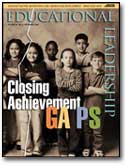November 1, 2004
•
5 min (est.)•
Vol. 62•
No. 3All About Accountability / “Teaching to the Test”: An Expression to Eliminate

If some misguided investigator, bereft of anything better to do, tried to rank the phrases most frequently spoken by the world's educators, “teaching to the test” would surely fall near the top of the list. U.S. educators would guarantee that phrase's lofty worldwide ranking almost single-handedly. After being pummeled by more than two decades' worth of test-based accountability, one in every three U.S. educators seems to be touting test-focused teaching.
Yet despite its frequent utterance, “teaching to the test” is a phrase that clear-thinking educators should dump without delay from their professional conversations. That's because two decidedly different meanings lurk inside this seemingly innocuous phrase. As a result, confusion almost always arises when any school decision revolves around “teaching to the test.” Such confusion often has a harmful impact.
We test kids in the first place to find out whether a particular student has mastered the skills and knowledge—the content standards, education objectives, or curricular aims—that we want him or her to learn. Unfortunately, we can't tell simply by looking at students whether or not they have mastered a curricular aim. So to get a fix on how well students are attaining curricular aims, we build tests to serve as stand-ins for those aims. When students perform well on these proxy tests, we conclude that the students have mastered the skills and knowledge that the tests were designed to assess. Poor performance by students on the tests, of course, leads to the opposite conclusion.
To illustrate, when we ask a 4th grader to complete a 20-item spelling quiz containing words drawn from a district-approved list of 200 words, we use the student's performance on the 20-word quiz to arrive at a judgment regarding how well the student can spell the full set of 200 words.
When some people talk about teaching to the test, they mean that the teacher should try to get students to perform well on the particular items in a particular test—in our example, to drill students on the 20 specific words that will appear on the spelling quiz. This item teaching is a bad thing. When students who have been item-taught perform well (or poorly) on a particular test, we learn almost nothing about how well those students have actually mastered the curricular aims represented by the test.
Remember, we use tests to get a fix on students' mastery of the skills and knowledge represented by those tests. Students who have been item-taught may score high on a frequently practiced test, but they probably haven't mastered what that test represents. Teachers who item-teach, therefore, almost always arrive at misleading overestimates of what their students have truly learned.
In contrast, when some people advocate teaching to the test, they mean that the teacher should try to get students to master the curricular aims represented by a specific test. Such curriculum teaching is a good thing. If a teacher has not taught directly toward a set of items on a particular test, then students' high performance on the test shows that they learned what they were supposed to learn, not merely that they sparkled on one set of previously practiced items.
Happily, curriculum teaching is frequently encountered when we see language arts teachers attempting to enhance their students' composition skills. A teacher who sets out to have students become skilled writers of persuasive essays, for example, wants those students to acquire a generalized mastery of that skill, not just the ability to write a single essay persuading the city council to build more public parks. We want our students to acquire skills so solidly that they can then apply those skills in a variety of in-school or post-school settings. Curriculum teaching helps us do so.
To illustrate how the confusion stemming from this double-meaning phrase can harm students' education, think about a school superintendent who, several months prior to the upcoming spring's accountability tests, sends out a memorandum urging the district's teachers to “teach to those tests with all your might!” If the superintendent meant curriculum teaching, but the district's teachers believed that the memo called for item teaching, then an instructional calamity is certain to ensue.
To avoid such confusion, I recommend that you never use the confusion-inducing phrase “teaching to the test.” Instead, toss in a few extra words so that you say either “teaching toward a specific test's items” or “teaching toward the curricular aim represented by the test.” These tiny verbal elaborations will yield big-time clarity dividends. And if you find yourself in the midst of a professional conversation regarding some variant of test-related teaching—a conversation during which one of your colleagues utters the despicable phrase, “teaching to the test”—be sure to ask, “What do you mean?”
